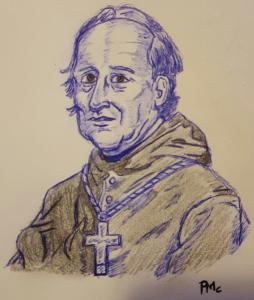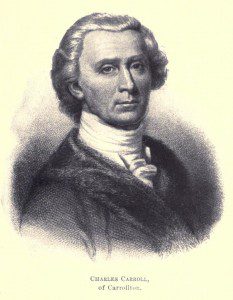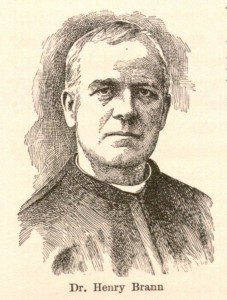![crossflagourchur00sheauoft_0066[1]](https://wp-media.patheos.com/blogs/sites/224/2013/07/crossflagourchur00sheauoft_00661-221x300.jpg) 320. Patriotism Among Catholics. We have seen that the discovery and exploration of America and the subsequent Christianizing and civilizing of the Indians were preeminently Catholic enterprises; also that the colonial times were dark and intolerant for Catholics. The opposition of the colonies to the Quebec Act proved plainly that the old anti-Catholic prejudices were still very much alive. During the war, however, the colonial Catholics, forgetting the many wrongs of the past, unanimously supported the patriot cause. Nor did they distinguish themselves only in the army and navy, but also in council halls and legislatures. In the day of trial the Catholic faith proved the grandeur of its principles. It produced no traitors, no oppressors of their country.
320. Patriotism Among Catholics. We have seen that the discovery and exploration of America and the subsequent Christianizing and civilizing of the Indians were preeminently Catholic enterprises; also that the colonial times were dark and intolerant for Catholics. The opposition of the colonies to the Quebec Act proved plainly that the old anti-Catholic prejudices were still very much alive. During the war, however, the colonial Catholics, forgetting the many wrongs of the past, unanimously supported the patriot cause. Nor did they distinguish themselves only in the army and navy, but also in council halls and legislatures. In the day of trial the Catholic faith proved the grandeur of its principles. It produced no traitors, no oppressors of their country.
After the American alliance with Catholic France, the law excluding Catholics from civil rights was repealed. With this event dawned a new era for Catholicity in America. Among prominent Catholic leaders in the army may be mentioned : Stephen Moylan, the French Counts, Lafayette and Rochambeau, the noble Poles, Kosciusko and Pulaski, the German Barons, Steuben and De Kalb, and the Indian chief, Orono. Stephen Moylan occupied one after another, offices of trust in the American army and rounded out the full measure of his service with General Greene in the southern campaign at the close of the war. William Paca, a signer of the Declaration of Independence, held numerous political offices in his own state, and was a member of the State convention which ratified the federal Constitution. Thomas Fitzsimmon was a member of the First Continental Congress, took part in the Trenton campaign, and was a member of the convention that framed the Constitution of the United States. Daniel Carroll of Maryland was the only other Catholic member. Eminent Catholics in the navy were Captain John Barry and Jeremiah O’Brien.
Catholics who figured prominently in Congress were the famous Charles and Daniel Carroll, William Paca, and Thomas Fitzsimmon. There was an entire Catholic regiment, sons of Ireland, in the Pennsylvania line. Washington’s personal guard, the flower and choice of the army, was largely composed of Catholics. At the close of the war a solemn ”Te Deum” was chanted (November 4, 1781) in one of the Catholic churches in Philadelphia. Members of the United States Congress, Washington, Lafayette, and many of the distinguished generals and citizens attended. The Catholics of the United States, in common with their fellow-citizens, hailed with joy the election of George Washington as first President under the new Constitution. Before the inauguration, Bishop Carroll, on behalf of the Catholic clergy, united with the representatives of the Catholic laity (Charles Carroll of Carrollton, Daniel Carroll of Maryland, Dominic Lynch of New York, and Thomas Fitzsimmon of Pennsylvania) in an address of congratulation to the new President. The memorable and cordial reply of “Washington “To the Roman Catholics of the United States” was as follows: “I hope ever to see America among the foremost nations in examples of justice and liberality; and I presume that your fellow-citizens will not forget the patriotic part which you took in the accomplishment of their Revolution, and the establishment of their government, or the important assistance they received from a nation in which the Roman Catholic faith is professed. . . . May the members of your Society in America, animated alone by the pure spirit of Christianity, and still conducting themselves as the faithful subjects of our free government, enjoy every temporal and spiritual felicity.”
With the birth of the new nation, the ultimate outcome of a fourteen-year struggle for independence and nationality, we may fittingly close this eventful epoch with the following extract from the Pastoral Letter of the Fathers of the Third Plenary Council of Baltimore (December 7, 1884) : “We consider the establishment of our Country’s independence, the shaping of its Liberties and Laws, as a work of special Providence; its framers ‘building better than they knew,’ the Almighty’s Hand guiding them.”
Franciscan Sisters of the Perpetual Adoration, History of the United States for Catholic Schools (New York: Foresman and Company, 1914), 239-242.











